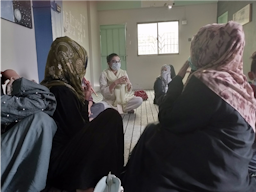why Baloch Women in Feminism
Apr 28, 2022
Story
I am a woman with a political vision, belief that Women should be everywhere, and in every nomination. Being a woman is a blessing; however, it has turned into a curse by the patriarchal society. Thinking of being a woman in general and its various forms in the shape of a mother, sister, daughter, and wife forces one to question the abstract perfection of this ideal form. Unfortunately, connotations attached with this perfect entity are weak and frightening at the same time make the position more of a woman vulnerable in both the domestic and public spheres.
Thoughts would tangle up in my head whenever I hear the word gender in our society. Constrained and male-dominant surroundings force me to think over this current imbalanced society and the backwardness that we are inching towards where women do exist, but in the form of slaves with no unequal gender status.
Nonetheless, many societies around the world are focusing on women's questions and the feminist discourse. Making their position and debate potent over women’s participation, equity, and empowerment in society. Hence, Women have made extraordinary progress globally breaking taboos and accessing positions of power and authority with their tireless struggle. If we look back into history, we witness initial small-scale agitations targeting the patriarchal mindset to demand basic goods for women happening as early as the 4th century.
Today’s feminism or women’s movements are the cumulative results of all such small efforts. Also, all these forms of feminism (Radical Feminism, Liberal Feminism, Socialist Feminism, Black Feminism, Marxist Feminism, Postcolonial Feminism, etc.) have emerged out of the struggle against the unequal treatment of women.
All these forms have one common aim and that is to end the oppression of women. Despite the years of struggle, still, terminologies such as feminism are debated for their meanings. This pattern is seen more frequently in societies where feminist discourse is treated as a counter–ideology. In such settings, the phenomenon is usually debated inaccurately and dismissed furiously. Indeed, among many other things, this reaction shows the fear among the structure of dominance in staunchly patriarchal societies which are afraid of losing their dominance.
Although, the forms of patriarchal dominance have changed from one era to another the exploitation of women’s rights remains unchanged. In a patriarchal society, no ideology or struggle will be emancipatory without liberating women or in other words, without being feminist in itself. Feminism is not only the struggle to liberate women from patriarchy but also to liberate men and society as a whole from an oppressive tool of its own making. As Simon de Beauvoir says in ”The Second Sex” liberation for women is liberation for men too.
Today each country has its feminist struggle, addressing women’s issues in their particular contexts. Such as, Indian feminism is dealing with some core issues prevalent across South Asia such as early child marriages, girl’s education, dowry, and honor killings among other common issues. Similar shades of feminism are seen across the globe where women organize and mobilize for their freedom from multiple forms of patriarchal oppression. The Baloch women are facing double oppression like women in most of the underdeveloped and politically oppressed societies. Besides patriarchal cultural suppression in the name of honor, they lack access to basic needs such as basic healthcare and primary literacy. This double oppression is however not acknowledged in patriarchal politics.
There have been many needless controversies over the feminist discourse in Baloch society, mainly over the use of the word feminism that is seen as a western concept, alien to the Baloch society. Indeed, every society is unique in its way but still, we cannot deny the common sufferings of women in most patriarchal societies.
An honor killing or the cruel tribal practice of Syah Kaari, child marriage, absence of political and social opportunities, sexual harassment, domestic violence, humiliating virginity tests, and unrecognized domestic labor are a few realities in the long list of sufferings a Baloch woman endures. Besides these common ills of patriarchy, there is an additional psychological, financial, and social pressure on those Baloch women whose male family members have been forcibly disappeared. Most of these issues are women’s issues, although different from the issues faced by women in the west but these issues demand a feminist solution by women and for women.
If women in other societies can shape social movements according to their specific circumstances then why can’t Baloch women? If we pay heed and attention, of course, set aside the conventional and rigid denial of these issues, we may learn a lot from the glorious lessons of feminism and other counter-hegemonic social movements. For example, many comparable traditions and debates could be found in Black feminist consciousness and action, which arose from an understanding of intersecting patterns of discrimination in the US. In short, in the 1970s Afro American Black Women introduced Black feminism by stepping forward to demand attention to be paid to the double burden of being women and black.
It is high time for the Baloch women to introduce “Baloch Feminism” by closely observing the current situation of women in Baloch society across Balochistan, Sindh, and work on the ways to overcome cultural conservatism and state repression to make Baloch society progress. The struggle for the emancipation of women must be fought by women in the leader of women alongside other progressive forces in the society. We must organize and fight to end oppression in its all forms; from patriarchal oppression of women to national and class oppression of the masses as a whole.




